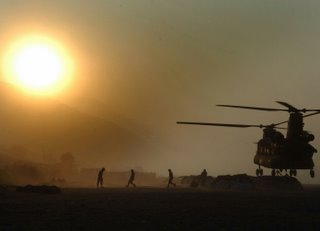
Hand in hand with the deployment of advanced military technology, comes advanced communication methods. Long gone are the letters from soldiers back to the family at home via the hands of military censors. Today's soldiers are blogging real time events from the field.
The SMH today reports the concerns the US Military in Iraq are expressing about this growing trend. I can see the downside with sensitive strategic information (eg where deployed etc) and potential undermining of military discipline - but the upside surely must be the advantage the harsh light of public awareness and opinion will have on the activities in the war zone. If blogs had existed in WW1 public opinion may have cut short the muddy killing fields of France.
My great great great Uncle did not return from France. My families surviving record of his sacrifice is a letter in his hand sent from a village in England three months before his death as he describes training to join the front line. No sensor's marker here but clear self censorship or most likely rules as he gives scant information on when or where he will be shipped to - or perhaps he didn't even know.
The Us military would be wise if it simply put in place guidelines for blogs from the front line and encouraged this openness with the American people.
US military finds soldiers' blogs too close for comfort
By Oliver Poole in BaghdadDecember 28, 2005
ANYONE wanting to hear daily insights into what it is like to be in a convoy hit by an explosion or ordered to pick up the body parts of comrades dismembered by a suicide bomber does not have to be there in person any more.
Instead they just need to log on to the internet from the safety of their home or office.
In a development that is worrying US military commanders in Iraq, a growing number of US soldiers - 200 at the last count - have set up their own blogs, or internet diaries, and are updating them from the battlefield.
The phenomenon, helped by internet cafes at almost all US camps to permit soldiers regular contact with home, has for the first time allowed personal reports of the reality of combat to be read as they happen.
In the past, public understanding of life at the front was limited to what journalists were able to see or governments told them. First-hand accounts by the soldiers involved had to wait until units went home or through letters, which were often censored and could take months to arrive.
But now someone wanting to learn what it was like to be in a lorry hit by a roadside bomb north of Baghdad - an incident the military considered worthy of three sentences - can consult www.sgtlizzie.blogspot.com.
"I started to scream bloody murder, and one of the other females on the convoy came over, grabbed my hand and started to calm me down," Sergeant Elizabeth Le Bel wrote a few hours after the attack from a computer at a military hospital. "She held on to me, allowing me to place my leg on her shoulder as it was hanging free. I learned the truck driver had not made it through Â…"
Most of the sites started as simple diaries intended to keep in touch with friends and family. But some quickly developed a fan base of thousands. Websites now exist to direct viewers to blogs from specific units or locations.
It is a phenomenon that has inevitably raised concern among commanders. In April the US military published its first policy memorandum on websites maintained by soldiers, requiring them to have official approval before starting internet postings.
In July the first soldier was punished for publishing information considered sensitive, which includes mention of incidents under investigation or names of servicemen killed or wounded.
Leonard Clark, a National Guardsman, was demoted to private after he had written entries describing the company's commander as a "glory seeker" and the battalion sergeant major an "inhuman monster". His last entry detailed how his fellow soldiers were becoming opposed to the US operation in Iraq.
There was heightened official concern last month when an US web journalist who first aired claims that US troops had used white phosphorous to attack insurgents in Falluja said he had got his information from a blogger.
Mark Kraft, of Livejournal, said one of his sources had subsequently been threatened, demoted and told not to maintain a blog or read or reply to any others.
Telegraph, London

No comments:
Post a Comment